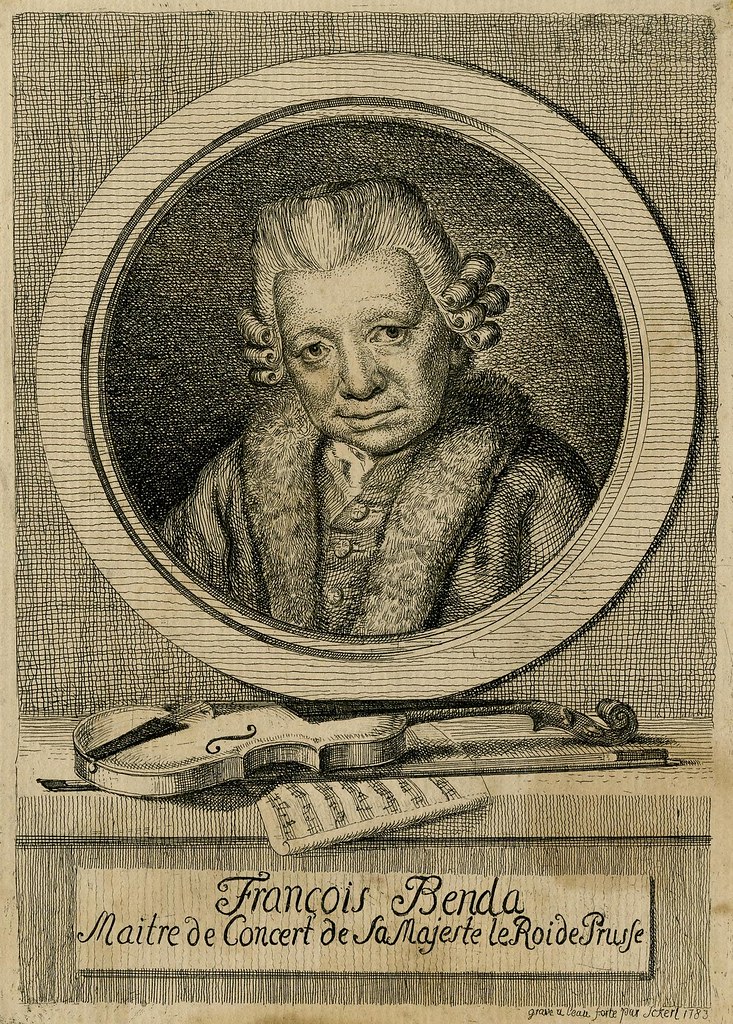František Benda (1709-1786) - Sinfonia ex C (1762)
Performers: Slovak Chamber Orchestra; Bohdan Warchal (1930-2000, conductor)
Further info: František Benda (1709-1786) - Symphonies
---
Violinist and composer, son of Jan Jiří Benda (1686-1757). His
autobiography, written in 1763, presents details of his early training
and the musicians with whom he associated during his long career; the
documentation of his own activities and references to his associates
make this one of the most frequently cited documents of the era. As a
youth Benda was an excellent singer, and this talent provided for much
of his early musical education as well as for his material needs,
starting in 1718 at St Nicholas’s in Prague, from 1720 in the Hofkapelle
at Dresden. He returned to Prague in 1723 as an alto and student in the
Jesuit seminary, where he began his first compositions, now lost. While
participating in a performance of J.J. Fux’s Costanza e Fortezza, he
was particularly impressed by the singing of Gaetano Ursini, whose style
he emulated. The Jesuits permitted Latin texts to be added to these
italianate arias, which Benda sang with great success. When his voice
broke he returned to his parents’ home and began to focus his studies on
the violin, particularly through studying the concertos of Vivaldi. At
his father’s insistence he learnt the linen weaving trade, but he also
played for dancing in taverns; he claimed later to have learnt much from
a blind fiddler. Benda next held a series of appointments as a
violinist in aristocratic households in Vienna, where he encountered
many of the best musicians of the day. Together with several of these
young musical friends, Benda ran away from his employers, eventually
finding a position as Hofkapellmeister to Count Suchaczewsky in Warsaw,
where he remained for more than two years. From this point his
reputation as a musician and violinist preceeded him, and in 1732 he was
invited to join the royal court orchestra in Warsaw, an offer which he
accepted. However, dissatisfaction with his salary and duties led him to
seek a better position, and the death of August II on 1 February 1733
provided an opportunity to return to Dresden; while visiting nearby
Ruppin, he was engaged as violinist by Crown Prince Frederick of Prussia
on 17 April 1733.
During his early years in Frederick’s entourage Benda visited Dresden
again, renewed his acquaintance with the violinist Johann Georg Pisendel
and participated in performances with C.P.E. Bach and J.E. Goldberg. He
remained to his death in the service of Frederick, following him to
Rheinsberg in 1736 and then to Potsdam when Frederick assumed the throne
in 1740. He was appointed Konzertmeister in the king’s Kapelle in 1771.
As a member of one of the outstanding musical establishments of the
mid-18th century, Benda found himself in company with some leading
musicians. He studied the composition and performance of adagios with
Johann Gottlieb Graun, and later studied concerto writing with Carl
Heinrich Graun. He continued to be recognized as a singer during the
early years of his appointment, and in his autobiography related that he
was expected to perform arias at court regularly. Benda evidently
became a mainstay of Frederick’s orchestra. In his autobiography he
estimated that he had accompanied the king, an avid flautist, in 10,000
concertos. His position was reflected clearly in the salary schedule for
1744-45, in which he ranked third, behind the Kapellmeister C.H. Graun
and Konzertmeister J.G. Graun. Charles Burney described Benda as one of
the prominent musicians at the court in Berlin, one who had ‘acquired a
great reputation in his profession, not only by his expressive manner of
playing the violin, but by his graceful and affecting compositions for
that instrument’. Benda’s stature was reflected in the publication of
his death notice in the Berlinische Nachrichten von Staats- und
gelehrten Sachen of 16 March 1786: ‘On the seventh of this month one of
the most noteworthy and highly esteemed men of his time died, the royal
Konzertmeister Franz Benda …. It is generally known that he was one of
the greatest musicians, and that upon his instrument, the violin, he
created an epoch.’ Of his six children who survived infancy, four became
musicians: Maria Carolina Benda (1742-1820), Friedrich Benda
(1745-1814), Karl Hermann Heinrich Benda (1748-1836) and Juliane Benda
(1752-1783).

Cap comentari:
Publica un comentari a l'entrada